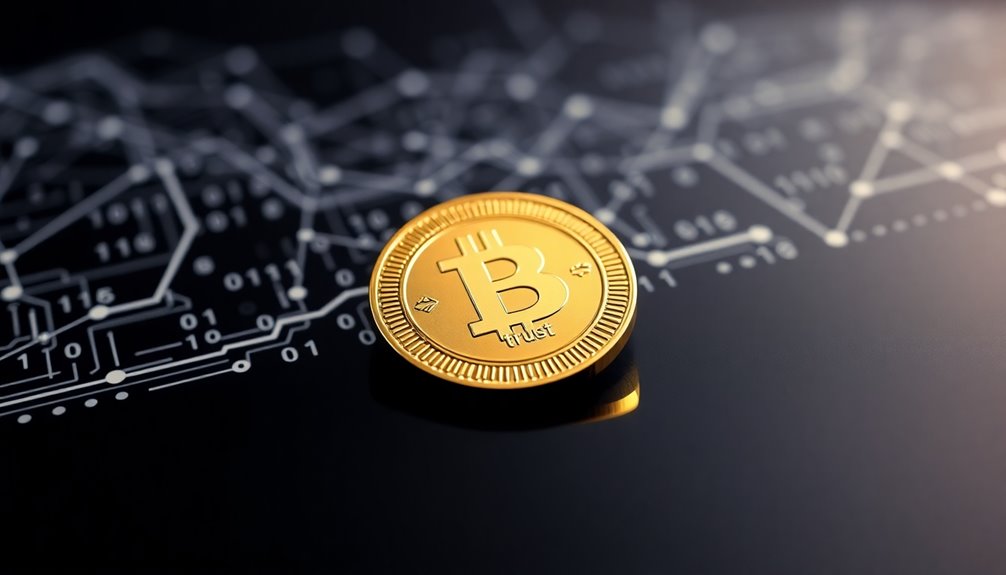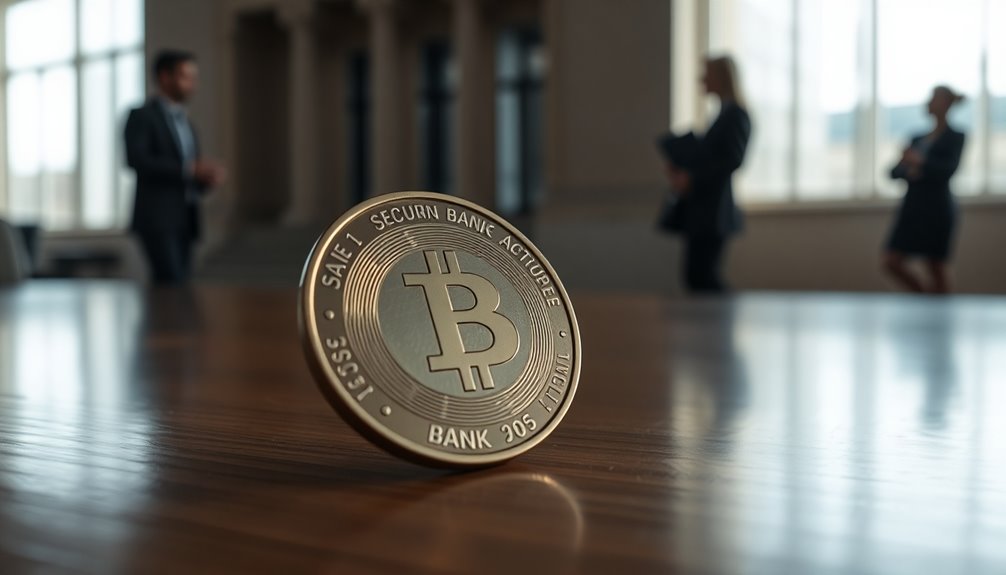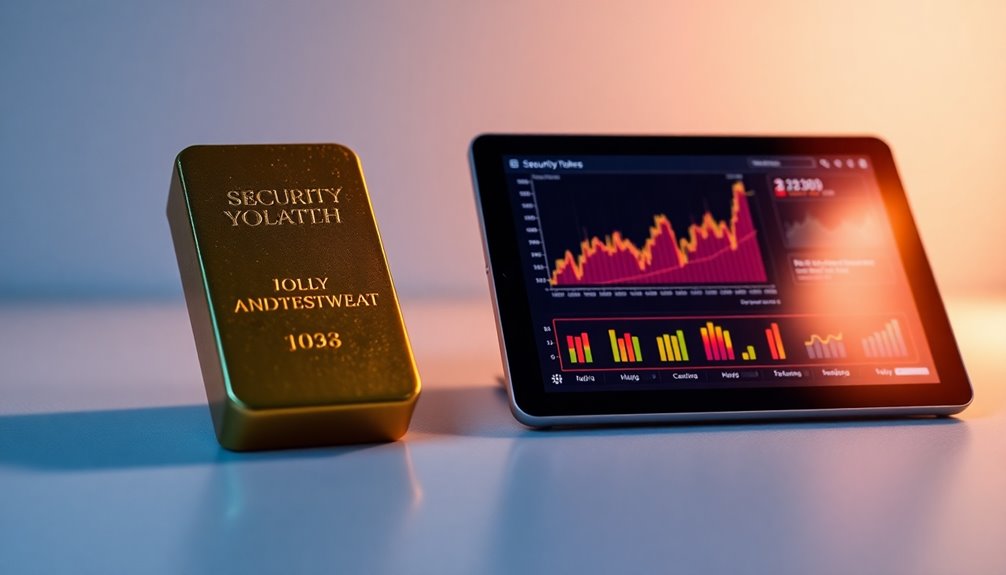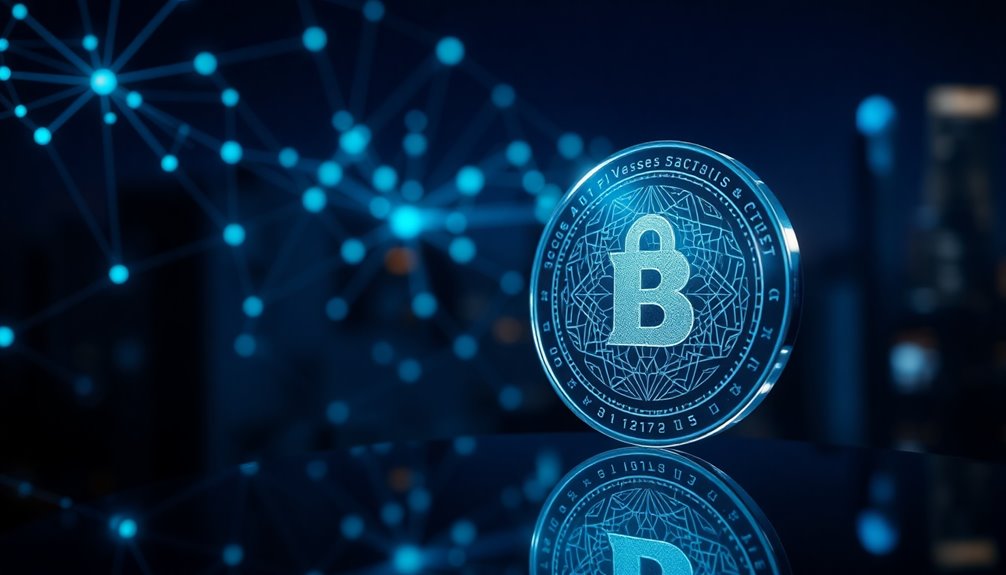Security tokens are digital assets that represent ownership in real-world items, blending traditional finance with blockchain technology. They allow you to invest in high-value assets through fractional ownership, increasing liquidity and accessibility. Security tokens must comply with regulations, often requiring registration and adherence to KYC and AML protocols. While they offer advantages like enhanced security and efficiency, there's also market volatility and regulatory challenges to consider. If you're curious about their applications and the evolving landscape, there's much more to uncover that can enrich your understanding.
Key Takeaways
- Security tokens are digital representations of ownership in real-world assets, ensuring liquidity and regulatory compliance through tokenization.
- They enable fractional ownership, increasing accessibility to high-value assets and enhancing market liquidity.
- Security tokens utilize blockchain technology, which improves transparency, reduces fraud risks, and lowers transactional costs by minimizing intermediaries.
- Compliance with regulatory frameworks, such as SEC regulations in the U.S., is essential for market entry and investor protection.
- These tokens provide access to traditionally illiquid assets and create a 24/7 global market for asset engagement.
Tokenized Asset Overview

Tokenized assets represent a revolutionary shift in how we think about ownership and investment.
You're now able to invest in traditionally illiquid assets like real estate through fractional ownership, enhancing liquidity and making these investments accessible globally.
By breaking down geographical barriers, tokenized assets invite a diverse range of investors to participate, especially in markets like fine art.
With blockchain technology, you enjoy increased transparency about ownership and transaction histories, significantly reducing fraud risks.
Plus, you'll benefit from lower transactional costs due to fewer intermediaries involved, which is essential for reducing friction in asset trading.
This innovation not only streamlines the process but also creates a 24/7 global market, allowing you to engage with assets anytime, anywhere.
Embrace the future of investment with tokenized assets.
Defining Security Tokens Clearly

Security tokens are digital representations of ownership in real-world assets, designed to provide both liquidity and regulatory compliance.
Unlike traditional cryptocurrencies, security tokens represent rights to physical assets like stocks or real estate, created through a process called tokenization. They leverage blockchain technology, ensuring security and transparency while adhering to strict regulatory frameworks. Digital security tokens are increasingly being used by companies for enhanced protection of their networks.
Each token can represent fractional ownership, making high-value assets more accessible. These tokens often include smart contracts, automating processes and ensuring compliance with securities laws.
By using security tokens, you gain an innovative way to invest, reducing risks associated with traditional investments while enhancing liquidity.
They're a crucial step toward modernizing investment practices in the digital age.
Token Issuance and Regulation

When embarking on the journey of issuing security tokens, understanding the intricate process and regulatory landscape is crucial.
First, you'll prepare by developing a solid business plan and investor materials. Next, decide on the token structure, including quantity and rights. You'll need to select reliable service providers, from blockchain platforms to legal intermediaries.
Capital raising involves identifying target investors and conducting roadshows.
Regulatory compliance is paramount; in the U.S., the SEC oversees security tokens under the Securities Act. Additionally, the security token market is valued at $3 billion in tokenized assets as of September 2023, highlighting the growing interest in this area.
You'll also need to adhere to KYC and AML regulations, ensuring only verified participants can invest. Choosing the right jurisdiction is essential, so consider local laws and possible exemptions as you navigate this complex landscape.
Pros and Cons

While considering the adoption of security tokens, it's essential to weigh their advantages and disadvantages.
On the plus side, security tokens enhance security by reducing theft risks and providing strong encryption. They offer increased efficiency, allowing for scalable asset trading and improved user experiences. Financially, they enable fractional ownership and 24/7 market access, making investments more accessible. Additionally, security tokens facilitate liquidity and accessibility to traditionally illiquid assets, appealing to a broader range of investors.
However, security risks persist, including potential theft and technical vulnerabilities. Regulatory challenges may complicate compliance, creating barriers for some investors. Additionally, market adoption can be limited due to these regulatory hurdles and operational complexities.
Therefore, it's crucial to evaluate both the benefits and drawbacks before diving into the world of security tokens.
Security Tokens vs. Traditional Assets

Understanding the differences between security tokens and traditional assets reveals how technology is reshaping ownership and investment. Security tokens represent ownership on a blockchain, making them digital and enhancing transparency.
Unlike traditional assets, they enable easier transfer and management of ownership, recorded securely on the blockchain. This is particularly significant as security tokens are classified as securities and must comply with regulations, similar to traditional securities. This ensures legal protection for both issuers and investors.
Security tokens also offer efficiency and accessibility, allowing fractional ownership and automating compliance through smart contracts. They trade 24/7, ensuring instant settlement and providing a digital wallet interface for tracking holdings and dividends.
Market Volatility Concerns

Market volatility is a significant concern when it comes to tokenized commodities. The commodities market is already known for its unpredictability, and tokenization can amplify this volatility.
With 24/7 trading, speculators can quickly react to news and events, leading to constant price fluctuations. This continuous trading environment increases risks for both investors and producers, as market activity doesn't pause for time zones. Additionally, unclear regulatory frameworks can create compliance issues, further complicating the landscape. When the value of security tokens fluctuates based on the performance of underlying assets, it becomes even harder to determine fair value. Furthermore, the lack of standardization in tokenization practices can exacerbate the challenges faced by investors in this dynamic market.
If not managed properly, these factors can result in significant losses for investors navigating this volatile terrain.
Emergence of Blockchain-Based Platforms

As the demand for security tokens grows, blockchain-based platforms are emerging as powerful tools to facilitate this transformation.
These platforms utilize blockchain technology to ensure transparency and immutability in asset ownership. By automating processes through smart contracts, they significantly reduce manual intervention, ensuring compliance with securities laws. This automation leads to enhanced compliance through programmed jurisdictional regulations.
You can tokenize various assets like real estate and stocks, enabling fractional ownership and increased liquidity for traditionally illiquid investments. With 24/7 market access, you can trade anytime, reaching a global investor base.
The decentralized ledger enhances transparency, making it difficult to tamper with ownership records. As these platforms evolve, they pave the way for a more efficient and accessible marketplace for security tokens.
Conduct Thorough Legal Research

Conducting thorough legal research is crucial when navigating the complex landscape of security tokens, especially since regulations can vary significantly by jurisdiction.
In the U.S., you'll need to comply with SEC regulations, including the Securities Act of 1933 and the Securities Exchange Act of 1934. Understanding the Howey Test is vital, as it helps determine if your token qualifies as a security. Additionally, it's important to recognize that security tokens are considered investment vehicles that are subject to financial regulations.
In Europe, regulatory bodies like ESMA and ECB have their own guidelines. You'll also want to differentiate between security and utility tokens, as they're treated differently under the law.
Don't forget about KYC and AML requirements, as well as disclosure obligations, to ensure you're fully compliant and protect your investors.
Frequently Asked Questions
How Are Security Tokens Different From Utility Tokens?
Security tokens and utility tokens differ mainly in purpose and regulatory treatment.
While security tokens represent ownership in assets and comply with strict regulations, utility tokens offer access to services within a platform and face less scrutiny.
When you invest in security tokens, you're aiming for returns, whereas utility tokens provide functionality rather than investment value.
Understanding these distinctions helps you navigate the blockchain landscape more effectively and make informed decisions.
Can Security Tokens Be Traded on Any Exchange?
You can't trade security tokens on just any exchange.
They're typically listed on specialized platforms that operate in regulated environments, ensuring compliance with securities laws.
These exchanges, like INX, focus on security tokens and have strict listing requirements.
While peer-to-peer transactions are also possible, you'll need to ensure that any platform you choose meets the necessary legal and regulatory standards to facilitate safe and compliant trading.
What Types of Assets Can Be Tokenized?
You can tokenize a wide range of assets, including tangible ones like real estate, art, and luxury goods, making them more accessible and liquid.
Intangible assets like intellectual property and carbon credits can also be tokenized, streamlining ownership and trading.
Financial assets, such as stocks and bonds, benefit from enhanced liquidity through tokenization.
Even fiat currencies and cryptocurrencies can be represented digitally, creating new opportunities for investment and trade.
Are Security Tokens Subject to Taxation?
Yes, security tokens are subject to taxation.
When you sell them, you'll face capital gains tax based on the difference between the sale price and your basis.
If you receive dividends or interest, those are taxed as ordinary income in the year you get them.
It's crucial to keep accurate records for your tax returns, as non-compliance can lead to serious penalties.
Stay informed about your obligations to avoid any issues.
How Do I Invest in Security Tokens?
Did you know that the global security token market is projected to reach $22 billion by 2026?
To invest in security tokens, you'll typically participate in a Security Token Offering (STO) on a blockchain platform.
Make sure to complete any required KYC and AML verifications.
Keep in mind that many STOs are geared towards accredited investors, so check your eligibility before diving in.
Always do your research to understand the risks involved!
Conclusion
In the ever-evolving landscape of finance, security tokens are like the fresh breeze that breathes life into traditional investing. As you navigate this digital frontier, remember that while they offer exciting opportunities, they also come with their own set of risks. Embracing this innovation means keeping your eyes wide open, ready to seize the potential while staying vigilant against the storms of market volatility. With the right knowledge, you can sail smoothly into a promising future.









